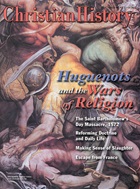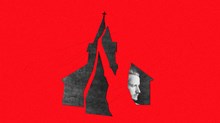In early summer the French Parliament passed anti-sect legislation that some evangelicals and members of other religious minorities fear could restrict their freedoms. This legislation is a far cry from Louis XIV's revocation of the Edict of Nantes in 1685, but it does raise questions about France's religious climate. To get a clear picture of the situation, Christian History contacted Sébastien Fath, a social scientist with France's National Center of Scientific Research and teacher at the Sorbonne University in Paris.
Why is France, a country that prides itself on pluralism and tolerance, suddenly suspicious of religious minorities?
Generally speaking, pluralism has never been so present in the French society. The challenge is learning to live together in a more and more plural society. The State has tried to adapt itself, but it isn't sure of its way yet. The local management of pluralism has its difficulties, too, but on the whole religious freedom is fully respected. Evangelicals, among other religious minorities, are very satisfied with it.
At the same time, though, French society reacts very strongly to the issue of cults and sects. The public was shocked by the collective suicides of the Solar Temple Order that occurred in Switzerland, Canada, and France in 1994 and 1995, when 78 people died. Also, France's political culture traditionally legitimates state intervention when social order seems threatened. Because the pluralistic society in France is less established than it is in America, cults and sects seem like a bigger threat. These elements explain why this law was voted in Parliament.
Is it fair to call France's anti-sect initiatives "religious persecution"?
The new legislation contains nothing related to "religious persecution." To imply this would be totally inappropriate. However, one can wonder at the necessity of such a law. Henri Tincq, a prominent French journalist, recently wrote in Le Monde that this law was "a progress for democracy." I wouldn't be so sure. Many believe that the existing legislation would have been quite sufficient to curtail the sectarian drift.
Whether the legislation might lead to religious persecution is a different question. The law contains provisions against "abuse of weakness or dependence," which seems to be very difficult to define. French evangelicals and other religious minorities have good reasons to fear that the new anti-sect legislation might encourage some localized forms of intolerance. Only time will tell if the actual application of the new law will lead to problems in the free practice of religion.
Does the specter of religious intolerance bring up any memories of the sixteenth-century Wars of Religion?
Unfortunately for French evangelicals today, outspoken evangelism appears to some parts of society as a new "war of religion." Proselytizing has bad press. The French media tends to favor a "religiously correct" picture of a respectful, modern religion that doesn't proselytize or defend an absolute truth on the public scene.
The best French sociologist of Protestantism, Jean-Paul Willaime, describes French culture as one in which religion is relegated to the private sphere. One can easily foresee the consequences for evangelicals. Active evangelism is their non-negotiable mandate, but it isn't well accepted culturally in France—even if, in principle, the law cannot set any obstacles to it.
What other factors make evangelicals somewhat suspect in France?
The French are very proud of their republican model, and they resent the fact that, during the twentieth century, the main reference in the world became the American model. They also fear that their Republic, where the state assures equality of rights, will be swept away by a "limp democracy," where interest groups trample over the weaker members of society. This is why French leaders from General de Gaulle to Jacques Chirac (and his Prime Minister Lionel Jospin, born into a Protestant family) have tried to limit the American influence in France, often with symbolic measures like legislation against American words entering the French language.
This can sometimes create difficulties for Protestants, and specifically evangelicals who cultivate many links with American evangelicals. When Billy Graham campaigned in France in 1955, 1963, and 1986, he was regularly accused of being "an agent of American imperialism." French evangelicals have been aware of this difficulty for a long time and have learned to adjust to it.
But evangelicals get some positive recognition, too. A well known French Protestant hymn, "La Cévenole," recalls the heroic resistance of the Huguenots during the times of persecution. It has been nicknamed "the Marseillaise of the Protestants." This hymn was written by prominent evangelical pastor and hymn composer Ruben Saillens, a proof among others that French evangelicals are not an "imported product" and that they fit well in the French religious landscape.
Where do the descendants of the Huguenots fit in that religious landscape?
Huguenot descendants are found today in all categories of French society. Some of them have become indifferent to religious matters, others have become Catholic, and many have remained Protestant. Among the last group, a majority belongs to the Reformed Church of France (the main French Protestant denomination), but many can be found in evangelical churches as well—Free churches, Baptist churches, Brethren churches, and even Pentecostal churches.
The largest annual gathering of French Protestants, which draws about 20,000 people, is the Desert Assembly. Held the first Sunday of September in the Cévennes, in the south of France, it commemorates persecutions while encouraging and uniting Protestants today. The Reformed are the most numerous, but Lutherans and evangelicals are also present, a proof that the Huguenot heritage has been spread to all the branches of Protestantism.
One of the difficulties encountered historically by Huguenot families was the transmission of the faith. Because of persecutions, Huguenot identity became in some cases an inherited thing rather than a conviction, especially during the eighteenth and first part of the nineteenth centuries. Evangelicals have strongly rejected such a restrictive definition. The idea of a Protestant "ethnic group" makes no sense to them, because they are concerned with conversion rather than family history.
Evangelicals in France numbered less than 100,000 around 1950. They're now about 350,000, a third of all French Protestants. To them as to the Huguenots of the sixteenth and seventeenth centuries, France remains a mission field where "salvation by grace only " must be publicly preached.
Copyright © 2001 by the author or Christianity Today/Christian History magazine.
Click here for reprint information on Christian History.

Support Our Work
Subscribe to CT for less than $4.25/month




























